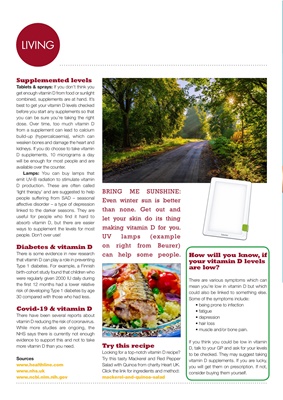
LIVINGLIVING
Supplemented levels
Tablets & sprays: If you don't think you
get enough vitamin D from food or sunlight
combined, supplements are at hand. It's
best to get your vitamin D levels checked
before you start any supplements so that
you can be sure you're taking the right
dose. Over time, too much vitamin D
from a supplement can lead to calcium
build-up (hypercalcaemia), which can
weaken bones and damage the heart and
kidneys. If you do choose to take vitamin
D supplements, 10 micrograms a day
will be enough for most people and are
available over the counter.
Lamps: You can buy lamps that
emit UV-B radiation to stimulate vitamin
D production. These
are often called 'light
therapy' and are
suggested to help
people suffering from
SAD - seasonal
affective disorder - a
type of depression
linked to the darker
seasons. They are
useful for people
who find it hard to absorb vitamin D, but
there are easier ways to supplement the
levels for most people. Don't over use!
Diabetes & vitamin D
There is some evidence in new research
that vitamin D can play a role in preventing
Type 1 diabetes. For example, a Finnish
birth-cohort study found that children who
were regularly given 2000 IU daily during
the first 12 months had a lower relative
risk of developing Type 1 diabetes by age
30 compared with those who had less.
Covid-19 & vitamin D
There have been several reports about
vitamin D reducing the risk of coronavirus.
While more studies are ongoing, the
NHS says there is currently not enough
evidence to support this and not to take
more vitamin D than you need.
KIT
REPORT
How will you know, if
your vitamin D levels
are low?
There are various symptoms which can
mean you're low in vitamin D but which
could also be linked to something else.
Some of the symptoms include:
• being prone to infection
• fatigue
• depression
• hair loss
• muscle and/or bone pain.
If you think you could be low in vitamin
D, talk to your GP and ask for your levels
to be checked. They may suggest taking
vitamin D supplements. If you are lucky,
you will get them on prescription. If not ,
consider buying them yourself.
Sources
www.healthline.com
www.nhs.uk
www.ncbi.nim.nih.gov
BRING ME SUNSHINE: Even winter sun is better than none, so
get out and let your skin do its thing making vitamin D for you.
Oily fish are a source of the vitamin in the diet. And SAD lights
(example on left from Beurer)
could help some people.
Try this recipe
Looking for a top-notch vitamin D recipe?
Try this tasty Mackerel and Red Pepper
Salad with Quinoa from charity Heart UK.
Click the link for ingredients and method:
mackerel-and-quinoa-salad